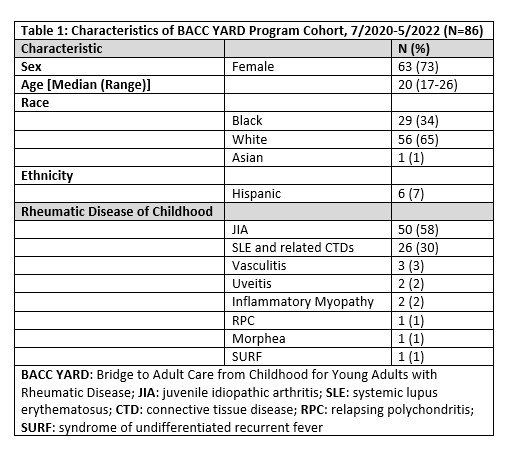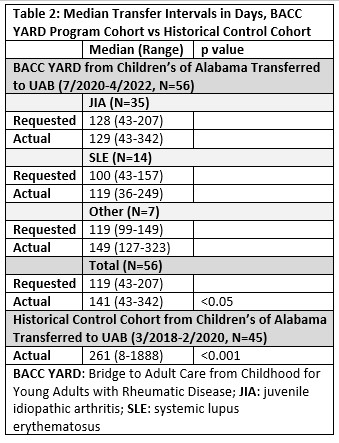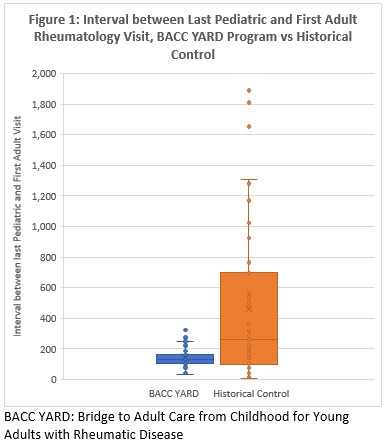Session Information
Date: Saturday, April 1, 2023
Session Type: Plenary Session
Session Time: 11:00AM-12:00PM
Background/Purpose: Children with chronic rheumatic conditions age and require transfer to adult rheumatologists for continued care. The transition period from pediatric to adult-oriented care is a high-risk time for disease flare and poor outcomes. Our objective was to design a structured transition program and determine the impact on time to first adult rheumatology appointment compared to historical controls.
Methods: In 2020 we initiated a specialized transition program structure utilizing a dual adult/pediatric rheumatology clinician with the goal to improve transition outcomes, the Bridge to Adult Care from Childhood for Young Adults with Rheumatic Disease (BACC YARD) Program. Young adults who received the BACC YARD intervention were compiled into an observational registry. In this first phase of the program, an adult/pediatric rheumatologist joined the care team for the final pediatric rheumatology visit, and then saw the patient with an adult rheumatology attending for the first visit in the adult rheumatology clinic. Requested timing for first adult rheumatology visit was determined by joint decision between the adult/pediatric rheumatologist and the pediatric attending at time of pre-transfer visit. The historical control cohort was obtained from the electronic records of Childrens of Alabama and University of Alabama at Birmingham (UAB) between March 1, 2018 and March 1, 2020. All historical patients were identified who had at least two pediatric rheumatology visits prior to transfer and were successfully transferred to UAB rheumatology. Data harvest was supplemented by individual chart review to ensure that there was no documentation of visits with a rheumatologist outside of the Childrens of Alabama/UAB system in the peri-transfer period.
Results: The BACC YARD program included 86 participants from 7/2020-5/2022. 8% of participants were lost to follow-up at Childrens of Alabama prior to the BACC YARD program but successfully re-established care at UAB through the BACC YARD program. 3.5% of participants were seen at other childrens hospitals for a childhood-onset rheumatic disease but established adult care at UAB through the BACC YARD program. 19% of participants had upcoming appointments scheduled at UAB but not completed by time of this analysis. 65% of participants successfully completed a pre-transfer visit at Childrens of Alabama and a post-transfer visit at UAB completed by 5/2022. 58% of the participants had a diagnosis of juvenile idiopathic arthritis and 30% had a diagnosis of systemic lupus erythematosus or similar connective tissue disease (Table 1). Actual median transfer intervals were 129 days for JIA, 119 days for SLE, and 141 days for other diagnoses (Table 2). There was a statistically significant shorter median interval between last pediatric and first adult visit in BACC YARD compared to the historical control cohort (141 days vs 261 days, respectively, p 0.001; Figure 1).
Conclusion: The BACC YARD Program cohort had a significantly reduced median time to first adult visit compared to historical controls. After further study, the BACC YARD intervention could be disseminated to other clinics for young adults with childhood onset rheumatic disease.
Disclosures: J. Bridges: None; L. Huie: None; A. Alexander: None; R. Cron: None; M. Danila: None; V. Gennaro: None; L. Hughes: None; B. Lipham: None; L. McAllister: None; M. Mullen: None; A. Reed: None; D. Reiff: None; C. Smith: None; E. Smitherman: None; M. Stoll: None; P. Weiser: None; M. Mannion: None.
To cite this abstract in AMA style:
Bridges J, Huie L, Alexander A, Cron R, Danila M, Gennaro V, Hughes L, Lipham B, McAllister L, Mullen M, Reed A, Reiff D, Smith C, Smitherman E, Stoll M, Weiser P, Mannion M. The Bridge to Adult Care from Childhood for Young Adults with Rheumatic Disease (BACC YARD) Program, a Pediatric-to-Adult Rheumatology Transition Program [abstract]. Arthritis Rheumatol. 2023; 75 (suppl 4). https://acrabstracts.org/abstract/the-bridge-to-adult-care-from-childhood-for-young-adults-with-rheumatic-disease-bacc-yard-program-a-pediatric-to-adult-rheumatology-transition-program/. Accessed .« Back to 2023 Pediatric Rheumatology Symposium
ACR Meeting Abstracts - https://acrabstracts.org/abstract/the-bridge-to-adult-care-from-childhood-for-young-adults-with-rheumatic-disease-bacc-yard-program-a-pediatric-to-adult-rheumatology-transition-program/



